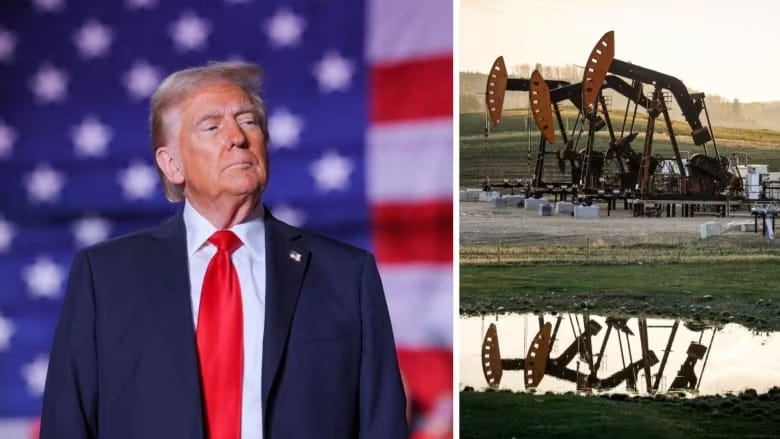Tariffs and 'drill, baby, drill' — What Trump 2.0 could mean for Alberta's energy sector
Trump tariffs are the 'weaponization of uncertainty,' says trade analyst

As Donald Trump prepares to assume the U.S. presidency again, some market analysts are expressing concern over the potential impact of his "America First" protectionist trade policies on Alberta's economy, particularly in the energy sector.
One of the most worrisome policies is Trump's proposal for a global minimum 10 percent tariff on imported goods. Al Salazar, head of macro oil and gas research at Enverus Intelligence Research, highlighted the uncertainty this tariff could bring. "The one thing that's the big cloud that's hanging over in terms of uncertainty is Trump's proposed tax on all imports, anything between 10 to 20 percent," Salazar noted. While he believes that imposing tariffs on crude imports to the U.S. could lead to higher gasoline prices and inflation, he also sees the potential for disruption in global supply chains.
In 2022, Alberta accounted for 87 percent of Canada's crude oil exports, with much of that oil heading to the U.S. While the completion of the Trans Mountain pipeline expansion has improved Canada's access to Asian markets, the U.S. remains a dominant customer for Alberta’s oil. This trade dependency could make Alberta particularly vulnerable under a second Trump presidency. During his campaign, Trump promised to prioritize domestic drilling, raising concerns about how this might affect trade with Canada.
Ruhee Ismail-Teja, vice president of policy for the Calgary Chamber of Commerce, expressed concerns about the potential implications for Alberta’s economy, especially considering the $3.6 billion in daily trade between Canada and the U.S. She added that while the future of U.S. tariffs remains unclear, discussions are ongoing about whether Canada’s energy sector might be exempted from the proposed tariffs.
On behalf of the Government of Alberta, I would like to congratulate President-elect @realDonaldTrump and Vice President-elect @JDVance on their victory. Alberta and the United States have a long standing trading partnership that has strengthened both economies and improved…
— Danielle Smith (@ABDanielleSmith) November 6, 2024
However, trade expert Carlo Dade of the Canada West Foundation was skeptical that Canadian oil would be exempt from the proposed tariffs, pointing out that Trump's proposal could create widespread uncertainty. "This is a threat unlike anything we've ever faced before," Dade said, suggesting that the uncertainty might be a strategy to bring jobs back to the U.S.
While some experts fear negative impacts for Alberta’s energy sector, others believe a Trump presidency could lead to higher oil prices. Eric Nuttall, partner at Ninepoint Partners, argued that the "drill, baby, drill" policy is unlikely to influence production rates in the U.S. significantly. He also noted that the U.S. relies heavily on Canadian heavy oil and imposing tariffs on Canadian oil could be counterproductive.
Calgary-based portfolio manager Martin Pelletier also sees the potential for higher oil prices under Trump, although he stressed that it’s too early to determine the overall impact on Alberta's economy. He warned that political handling of uncertainty regarding Trump’s policies could have economic consequences.
Ismail-Teja suggested that manufacturing might be a priority for the new administration, which could affect the energy sector. She emphasized that effective communication between Canadian and U.S. governments at both federal and state levels would be crucial to managing these challenges.
Alberta Premier Danielle Smith expressed confidence in Alberta’s vital role in North American energy security, congratulating Trump and noting the long-standing trading relationship between Alberta and the U.S. She looks forward to strengthening those ties during the new administration.
Finally, Dade cautioned that emphasizing Alberta's energy exports to the U.S. might not be the most effective approach, especially considering that many American officials may view Canada as a competitor rather than a partner in energy production. He advised that Alberta must reframe the conversation to better align with the changing political landscape.





